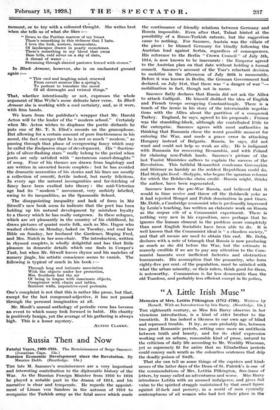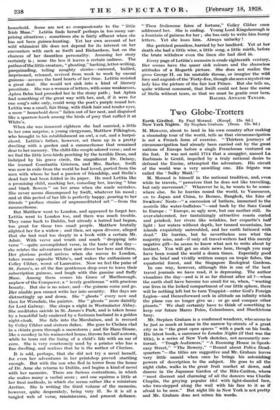" A Little Irish Muse "
Memoirs of Mrs. Letitia Pilkington (1712-1750). Written by Herself. With an Introduction by Iris Barry. (Routledge. 15s.) THE eighteenth century, as Miss Iris Barry observes in her vivacious introduction, is a kind of elder brother to the twentieth. It has indeed a likeness to our own age of • blind and repressed trouble. It lay, as ours probably lies, between two great Romantic periods, setting once more an antithesis between truth, and beauty, and for its chief expression working out an urbane, reasonable kind of prose, natural to the criticism of daily life according to Mr. Worldly Wiseman, yet so supremely fit for satire that no Elizabethan periods could convey such wrath as the colourless sentences that drip the deadly poison of Swift.
That she can tell us some things of the caprices and kind- nesses of the latter days of the Dean of St. Patrick's is one of the commendations of Mrs. Letitia Pilkington, free-lance of letters, by many called an adventuress and worse. Miss Barry introduces Letitia with an amused indulgence, and gives full value to the spirited struggle maintained by that small figure against ill-luck' and poverty, in a world of men cynically contemptuous of all women who had lost their place in the'
household. Some are not so compassionate to the " little Irish Muse." Letitia finds herself perhaps in too many sur- prising situations ; sometimes she is fairly affluent when she has not been guinea-hunting. Yet her own account of her wild whimsical life does not depend for its interest on her encounters with such as Swift and Richardson, but on the chances of her dauntless personality. Amusing her story certainly is ; none the less it leaves a certain sadness. The pathos of the little creature, "ghosting," hacking, letter-writing, pasquinading, telling naughty stories—caressed, bullied, imprisoned, released, revived from week to week by casual guineas—accuses the hard hearts of her time. Letitia resisted a great deal. She would not sink into a kind of literary prostitute. She was a woman of letters, with some weaknesses. Aphra Behn had preceded her in the stony path ; but Aphra had something of the great way with her, and, if it were for one song's sake only, could wrap the poet's purple round her. Letitia was a small, fair thing, with thick hair and tender eyes, a mere " household dove" fallen out of her nest, and disguised like a sparrow-hawk among the birds of prey that ruffled it at White's.
When she was innocent eighteen she had married, a little to her own surprise, a young clergyman, Matthew Pilkington, who brought to his establishment an owl, a cat, and a harpsi- chord. Letitia's father, however, set them up in a pretty dwelling with a garden and a summerhouse that remained dear to her memory. The child-like couple adored verse ; and so we find the little love-birds perching by the terrible Dean, and indulged by his grave circle, the magnificent Dr. Delany, the learned Constantia Grierson, and Mrs. Barber. Swift was now in exile from the world he had loved, parted from the men with whom he had a passion of friendship, and Stella's dead hair had been folded in its paper. He used Letitia like a promising child, mocking her, consoling her, leaving " blue and black flowers " on her arms when she made mistakes. She never seems discomposed by Swift, whatever his mood ; and at this period of her life is perfectly happy, pouring to her friends " profuse strains of unpremeditated art "—from the summerhouse.
But Matthew went to London, and appeared to forget her. Letitia went to London too, and there was much trouble. They came back to Dublin, but already a hatred had begun, too great for those two small people. Matthew brutally slighted her for a widow ; and then, set upon divorce, alleged that she had read too deeply in a book with a certain Mr. Adair. With verve and wrath and much " dropping into verse "—quite accomplished verse, in the taste of the day— she relates the adventures that now drove her here and there. Her glorious period arrives when she moves to London, takes rooms opposite White's, and wakes the enthusiasm of Colley Cibber, worst of Laureates. Now we feel the pulse of St. James's, as all the fine gentlemen drop over to leave their subscription guineas, and laugh with this gamine and fluffy Muse. Among them comes his Grace of Marlborough, nephew of the Conqueror, a " lovely gentleman " with gracious bounty. But she is no miser, and—the guineas come and go. Her nimble pen cannot write her into security. Her days are distractingly up and down. She " ghosts " every now and then for Worsdale, the painter. She " ghosts " more daintily fOr Lord Galway. She sleeps a night in Westminster Abbey. She meditates suicide in St. James's Park, and is taken home by a beautiful lady enslaved by a footman husband in a golden night-cloak. She falls into the Marshalsea, and is rescued by Colley Cibber and sixteen dukes. She goes to Chelsea clad in a chintz gown through a snowstorm ; and Sir Hans Sloane, like a monkey in his wainscoted house, throws her half a crown, while he tears out the lining of a child's lids with an ear of corn. She is very courteously used by a printer who has a fine dwelling, and realizes that he is the author of Clarissa.
It is odd, perhaps, that she did not try a novel herself, for even her adventures in her printshop proved startling enough. But with the son who fled in terror from the house of Dr. Arne she returns to Dublin, and begins a kind of novel with her memoirs. There are furious contentions, in which she makes many a verbal score ; and one squirms a little at her final methods, in which she seems rather like a miniature Aretino. She is writing the third volume of the memoirs, however, quite desperately, being very ill. So it is all a tangled web of verse, reminiscence, and present defiance. " Thou frolicsome &ice of fortune," Colley Gibber once addressed her. She is ending. Young Lord Kingsborough is a fountain of guineas for her ; she has only to write him funny letters. Yet she loses him. Always unlucky !
She perished penniless, harried by her landlord. Yet at her death she had a little wine, a little song, a little mirth, before the brute withdrew even the linen she had died in.
Every page of Letitia's memoirs is crude eighteenth century. Her scenes have the queer sick colours and the shameless attitudes of a Hogarth picture. She does not realize the gross George IL on his unstable throne, or imagine the wild fury and anguish of the 'Forty-five, though she sees a mysterious lady kiss the picture of the fair lost Prince. But she tells us, quite without comment, that Swift could not hear the name of Stella without tears, so that we must be gentle over hers.
RACHEL ANNAND TAYLOR.







































 Previous page
Previous page